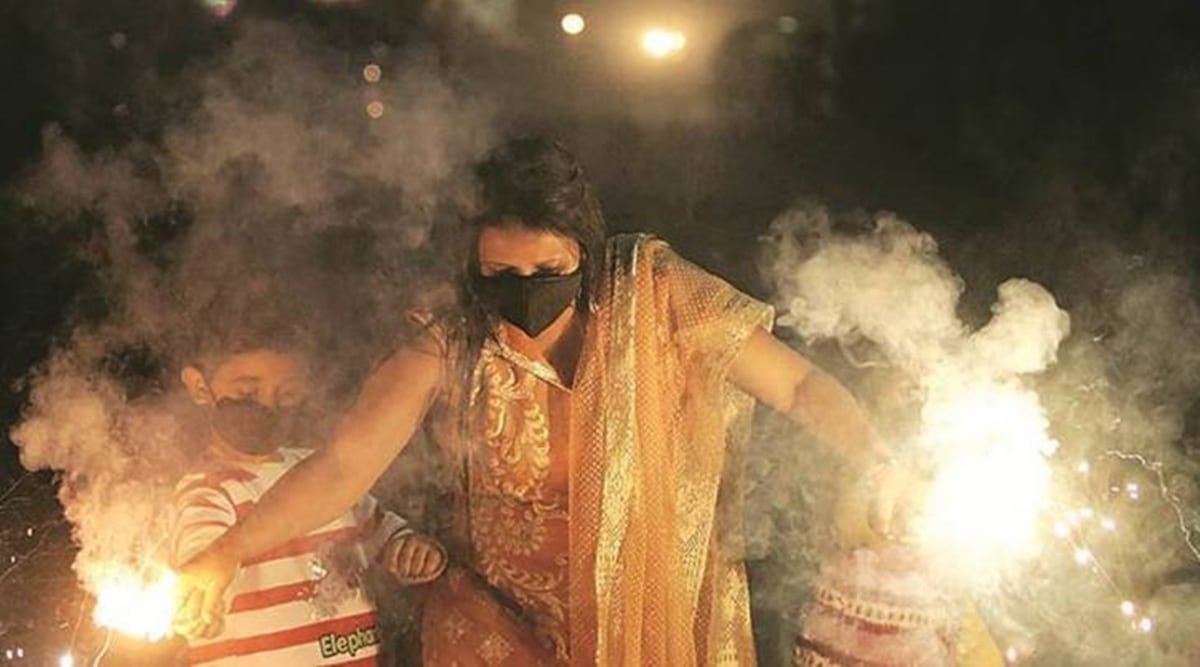 The Continuous Ambient Air Quality Monitoring Station (CAAQMS) reported that a reduction was recorded in the AQI, from 341 (Very Poor category) in 2019 to 140 (Moderate category) in 2020.
The Continuous Ambient Air Quality Monitoring Station (CAAQMS) reported that a reduction was recorded in the AQI, from 341 (Very Poor category) in 2019 to 140 (Moderate category) in 2020.The air quality in Chandigarh during Diwali improved as compared to the previous year. The ban on the sale and use of crackers in the city, imposed by the UT Administration, significantly contributed to the reduced air and noise pollution.
As per the Chandigarh Pollution Control Committee, the air quality in the city was the same as on a normal day.
Officials said that Chandigarh’s Air Quality Index fell under “Very Poor” category last year, whereas this year the AQI was “moderate”.
The Continuous Ambient Air Quality Monitoring Station (CAAQMS) reported that a reduction was recorded in the AQI, from 341 (Very Poor category) in 2019 to 140 (Moderate category) in 2020.
The ambient air quality data recorded on Diwali in 2020 is almost equivalent to the data captured on the days before Diwali, the administration said.
Debendra Dalai, Member Secretary of the CPCC, said that he attributes the improvement of air quality to cracker ban. “During the previous Diwali, air quality had worsened days before Diwali. On Chhoti Diwali as well, the air quality was very poor, with people bursting crackers in huge numbers,” Dalai said.
He added, “Usually, during this time, when the temperature dips, air quality worsens. On a normal day, its in the moderate category and to have the air quality not worsen post Diwali is a big achievement.”
Officials said that it was observed that in the past years, the AQI had worsened drastically on Diwali as compared to a usual day prior to Diwali.
“The results indicate that there is a remarkable reduction in air pollution in comparison to last year, despite of the fact that last year Diwali was on October 27 (air pollution is comparatively less than November), while this year, Diwali was on November 14,” an official said.
In 2019, the AQI on a usual day was recorded as 110, compared to 341 on Diwali.
The administration said that the ban on crackers was imposed to check the spread of Covid-19 and also avoid inconvenience to Covid-affected persons and others with respiratory issues.
On the consistent air quality, the Chandigarh Administration issued a statement, saying: “It is heartening to observe that the citizens of Chandigarh not only welcomed the move but also participated wholeheartedly in the fight against the prevailing pandemic situation and refrained from bursting of crackers, thereby, complying with the decision of the Chandigarh Administration. The ambient air quality data collected for the city beautiful is the testimony to the fact that the citizens of Chandigarh stood to the occasion for the cause of health and environment, as appealed by the Chandigarh Administration.”
It further said, “The Chandigarh Administration thanks the responsible citizens to have complied and respected the decision of the administration for the ban on sale and bursting of fire crackers in the UT Chandigarh. Thereby, showing their solidarity to fight Covid-19 pandemic and concern regarding air pollution.”
Noise pollution reduced
The Administration said that similar observation was also made in the ambient noise levels, wherein maximum noise level recorded during Diwali in 2020 as 66.6 dB(A) Leq against maximum level of 79.8 dB(A) Leq recorded on Diwali in 2019.
Opposition against ban on crackers
When the UT Administration had issued orders regarding the ban on crackers, on November 6, it roused a huge opposition by the traders.
The city cracker sellers had raised questions over the administration’s move to conduct a draw of lots for granting license to the sellers ahead of the ban.
A day prior to Diwali as well, the cracker sellers’ plea to permit them to sell firecrackers was rejected by UT Adviser Manoj Parida, saying that it was important to protect the health of Chandigarh residents in the times of Covid-19 pandemic.
On Sunday, UT Adviser Manoj Parida said, “We are proud of Chandigarh residents who mostly respected the ban on crackers and placed health concerns above recreation. Thanks for keeping our city green and pleasantly breathable.
Violation of the ban
Several residents of Chandigarh, however, said that cracker sounds were heard from several corners of the city, specially Sector 39 with ban being flouted at several places from sector 39 onwards.